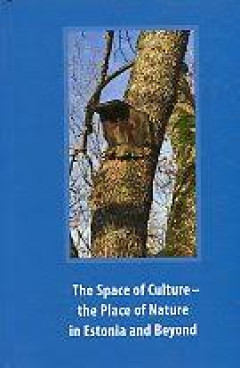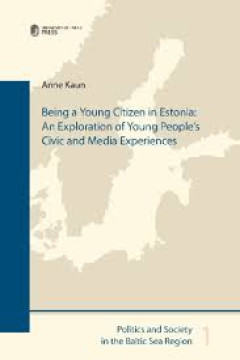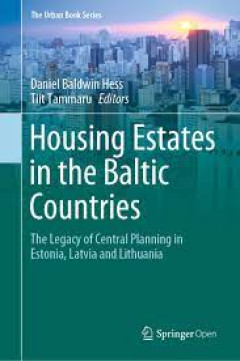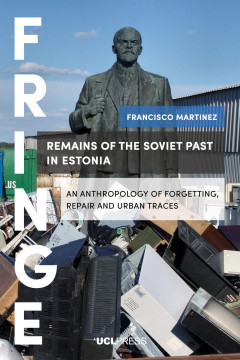Ditapis dengan

The space of culture:the place of nature in Estonia and beyond
This volume sets out to construct a tentative bridge between the physical and perceived (academic) worlds, between the understandings of culture and nature, their spatiality and temporality by tackling the spatiality of culture phenomena across disciplinary boundaries. The contributions are arranged around a general question of how humans organise the spaces in which they live. The book is divi…
- Edisi
- -
- ISBN/ISSN
- 9789949196234
- Deskripsi Fisik
- 190 pages : illustrations, maps ; 22 cm.
- Judul Seri
- -
- No. Panggil
- 306.094798 SPA s

Being a young citizen in Estonia:an exploration of young people's civic and m…
The book gives an intriguing insight into how young people in Estonia, twenty years after the establishment of democracy, perceive their own role as citizens. It does so in a theoretical framework that stresses the embeddedness of the civic experiences in a media-dominated environment, thus closely linking civic and media experiences. Based on the analysis of both qualitative interview data and…
- Edisi
- -
- ISBN/ISSN
- 9789949322749
- Deskripsi Fisik
- 132 pages, 1 unnumbered page ; 24 cm.
- Judul Seri
- -
- No. Panggil
- 799.2 KAU b

Housing Estates in the Baltic Countries :The Legacy of Central Planning in Es…
This open access book focuses on the formation and later socio-spatial trajectories of large housing estates in the Baltic countries—Estonia, Latvia, and Lithuania. It also explores claims that a distinctly “westward-looking orientation” in their design produced housing estates that were superior in design to those produced elsewhere in the Soviet Union (between 1944 and 1991, Estonia was…
- Edisi
- -
- ISBN/ISSN
- 9783030233921
- Deskripsi Fisik
- xviii, 383 p.
- Judul Seri
- -
- No. Panggil
- 307.76809479 HOU D

Remains of the Soviet past in Estonia :an anthropology of forgetting, repair …
What happens to legacies that do not find any continuation? In Estonia, a new generation that does not remember the socialist era and is open to global influences has grown up. As a result, the impact of the Soviet memory in people’s conventional values is losing its effective power, opening new opportunities for repair and revaluation of the past. Francisco Martinez brings together a numb…
- Edisi
- -
- ISBN/ISSN
- 9781787353534
- Deskripsi Fisik
- xix, 255 p. ill;
- Judul Seri
- -
- No. Panggil
- 974.98 REM F
 Karya Umum
Karya Umum  Filsafat
Filsafat  Agama
Agama  Ilmu-ilmu Sosial
Ilmu-ilmu Sosial  Bahasa
Bahasa  Ilmu-ilmu Murni
Ilmu-ilmu Murni  Ilmu-ilmu Terapan
Ilmu-ilmu Terapan  Kesenian, Hiburan, dan Olahraga
Kesenian, Hiburan, dan Olahraga  Kesusastraan
Kesusastraan  Geografi dan Sejarah
Geografi dan Sejarah